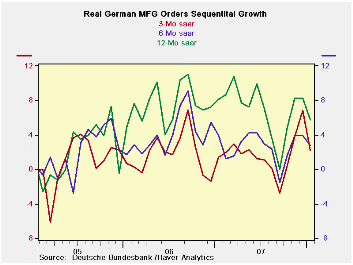 Global| Mar 06 2008
Global| Mar 06 2008German Orders Take Another Swing Lower
Summary
Manufacturing orders were a little weaker at the start of the year than in the fourth quarter said the German ministry in a classic understatement of the facts. It noted, however, mitigating factors, such as a change in the tax [...]

Manufacturing orders were a little weaker at the start of the year than in the fourth quarter said the German ministry in a classic understatement of the facts. It noted, however, mitigating factors, such as a change in the tax depreciation system at the start of 2008 that caused many domestic companies to pull their orders backward into 2007. Even with that pull back December orders fell. And the 2008 growth rate as of January 2008 compared to the Q4 base sees a 7.6% annual rate of decline in Q1 2008. Domestic orders are shrinking at a 2.4% pace. But foreign orders, an area unaffected by the depreciation rule in Germany, sees Q1 orders are off at a 12.3% annual pace.
German orders are being compressed. German domestic orders peaked in September 2006 and have been declining irregularly ever since. There was an order rebound in November and December of 2007 but the down shift is again in train.
In Germany sales trends show declines for consumer durables and nondurables. Sales of intermediate goods have seen resurgence while capital goods sales continue to be quite firm and have recently re-accelerated. This is a continuation of the same story that sees the consumer sector weak and capital goods remaining strong.
| German Orders and Sales By Sector and Origin | |||||||
|---|---|---|---|---|---|---|---|
| Real and SA | % M/M | % Saar | |||||
| Jan-08 | Dec-07 | Nov-07 | 3-MO | 6-Mo | 12-Mo | YrAgo | |
| Total Orders | -1.5% | -1.1% | 3.0% | 1.2% | 0.6% | 9.6% | 6.9% |
| Foreign | -1.3% | -2.5% | 2.3% | -5.9% | -3.0% | 13.3% | 5.6% |
| Domestic | -1.9% | 0.4% | 3.7% | 9.1% | 4.5% | 5.8% | 8.1% |
| Sector Sales | |||||||
| MFG/Mining | 1.4% | 1.1% | -0.7% | 7.3% | 3.6% | 5.9% | 9.1% |
| Consumer | -0.5% | 0.5% | -0.6% | -2.3% | -1.1% | 1.1% | 4.7% |
| Cons Durables | -2.6% | 2.8% | -0.2% | -0.4% | -0.2% | -1.5% | 7.0% |
| Cons Nondurable | 0.0% | -0.1% | -0.6% | -2.6% | -1.3% | 1.5% | 4.3% |
| Capital Goods | 2.7% | 0.9% | -2.1% | 6.0% | 3.0% | 7.9% | 11.3% |
| Intermediate Goods | 0.6% | 1.9% | 0.8% | 14.1% | 6.8% | 6.2% | 9.2% |
| All MFG Sales | 1.3% | 1.2% | -0.9% | 6.7% | 3.3% | 5.6% | 8.8% |
Robert Brusca
AuthorMore in Author Profile »Robert A. Brusca is Chief Economist of Fact and Opinion Economics, a consulting firm he founded in Manhattan. He has been an economist on Wall Street for over 25 years. He has visited central banking and large institutional clients in over 30 countries in his career as an economist. Mr. Brusca was a Divisional Research Chief at the Federal Reserve Bank of NY (Chief of the International Financial markets Division), a Fed Watcher at Irving Trust and Chief Economist at Nikko Securities International. He is widely quoted and appears in various media. Mr. Brusca holds an MA and Ph.D. in economics from Michigan State University and a BA in Economics from the University of Michigan. His research pursues his strong interests in non aligned policy economics as well as international economics. FAO Economics’ research targets investors to assist them in making better investment decisions in stocks, bonds and in a variety of international assets. The company does not manage money and has no conflicts in giving economic advice.
More Economy in Brief
 Global| Feb 05 2026
Global| Feb 05 2026Charts of the Week: Balanced Policy, Resilient Data and AI Narratives
by:Andrew Cates






